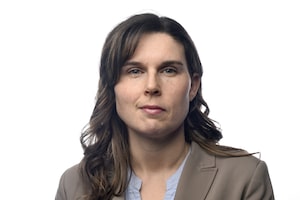Head coach Dwane Casey and the Toronto Raptors focused the majority of training-camp time on defence, changing schemes slightly.Nathan Denette/The Canadian Press
When Dwane Casey thinks back on leaving the arena after his team's final game last season, the first word that first springs to his mind is "hurt."
His Toronto Raptors had won a franchise-record 49 regular-season games and repeated as Atlantic Division champs. Point guard Kyle Lowry started in the all-star game, and sweet-shooting Lou Williams was the NBA's Sixth Man of the Year. Yet for a second straight season, the Raptors were bounced in the first round of the playoffs, this time in four straight games by the Washington Wizards. His team didn't fight desperately to survive in that final game; it got buried by a 125-94 avalanche.
"Hurt is the best word to describe what we felt, because of the work we had put in during the season – and we had had a good season," Casey said in a lengthy interview after practice this week. "I felt bad for the players and the city. I didn't sleep for a couple of nights. To whimper out the way we did was hurtful, and it motivated all of us to work this summer and come up with something we knew would sustain us through the playoffs."
Casey is back for a fifth season as head coach of the Raptors, who open their season Wednesday, hosting the Indiana Pacers. This squad is very different from the one that had the third-best offence among the NBA's 30 teams last season, but the 26th-best defence. Those Raptors finished fourth in the Eastern Conference, and often had a false sense of confidence that they could win by simply outscoring opponents, as Casey has repeatedly said. This group is built with more of a focus on Casey's defence-first philosophy.
Fans will notice a significantly leaner Lowry and a slightly different defensive role for DeMar DeRozan. Gone are players such as fan favourite Amir Johnson, Greivis Vasquez, Williams and Tyler Hansbrough. In their place, the franchise added gritty defenders such as DeMarre Carroll, who was crucial to last year's surprising Atlanta Hawks; Bismack Biyombo, a menace on the boards; and Canadian Cory Joseph, a point guard moulded by his four seasons with the San Antonio Spurs. In Luis Scola, they acquired a much-needed veteran.
"The front office brought us some grinding players, and we have more seriousness, professionalism and toughness now," Casey said. "I'm not saying guys like Amir didn't have that, but we've brought in guys who came from programs with the same defensive philosophy as we have, which is huge."
"A lot of cities would have loved the way we won games last year – scoring 105 points a game," he added. "I think this city wants a hard-nosed defensive team. That's what wins in the playoffs."
So the team focused the majority of its training-camp time on its defence, changing schemes slightly. The Raptors will compete in an Eastern Conference that's considered wide open.
"You're not going to have one game where we don't come out with the effort – people aren't going to look at the game and be, like, 'They didn't play hard,'" Carroll said. "You can't play a strong game every night, but you can always play hard. That's what coach Casey is trying to get us to do. Defence will be our calling card.
"I heard last year they didn't have guys really pushing each other to make them better. This year, you can see guys pushing each other. That's the beauty of this team."
Casey's job status was the topic of much debate in the media after last season, but general manager Masai Ujiri opted to retain him. The Raptors released two assistant coaches (Bill Bayno and Tom Sterner), and brought in Rex Kalamian, who'd spent six seasons with Oklahoma City, Andy Greer, who worked for the Chicago Bulls under Tom Thibodeau, and 18-year NBA veteran Jerry Stackhouse.
"It was Masai's call, the organization's call, so I didn't spend time thinking about whether I had a job," Casey said. "I honestly have never coached a single game or practice worrying about my job, because then you're coaching out of fear. I coach with confidence. If you're in the NBA coaching and worrying about your job, you're not going to last very long."
Casey's staff gave laminated role cards to every player, and each one was read aloud to the team – detailed job descriptions for every individual, from three-point shooting to breaking through screens. It's something teams did in Dallas and Seattle when Casey was an assistant.
"One of my pet peeves is when a player goes to you guys in the media and says 'I don't know my role.' That's the biggest cop-out I've ever heard," Casey said. "It's easy to follow them when things are going well, but tougher to buy into your role and be a good teammate when you're coming back from injury or someone is playing better than you. But [the job descriptions] are not worth a darn if you don't buy in and accept them during times of adversity."
 Rachel Brady
Rachel Brady